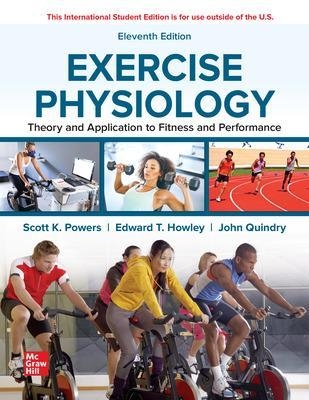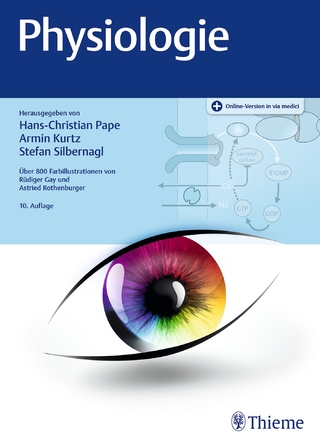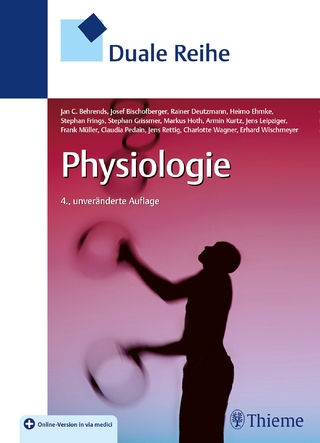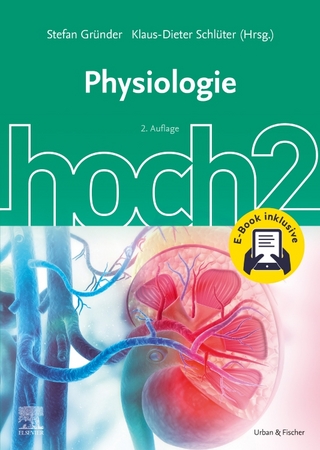
ISE Exercise Physiology: Theory and Application to Fitness and Performance
McGraw-Hill Education (Verlag)
978-1-260-57092-2 (ISBN)
- Titel z.Zt. nicht lieferbar
- Versandkostenfrei innerhalb Deutschlands
- Auch auf Rechnung
- Verfügbarkeit in der Filiale vor Ort prüfen
- Artikel merken
McGraw-Hill Connect® is a subscription-based learning service accessible online through your personal computer or tablet. Choose this option if your instructor will require Connect to be used in the course. Your subscription to Connect includes the following:
• SmartBook® - an adaptive digital version of the course textbook that personalizes your reading experience based on how well you are learning the content.
• Access to your instructor’s homework assignments, quizzes, syllabus, notes, reminders, and other important files for the course.
• Progress dashboards that quickly show how you are performing on your assignments and tips for improvement.
• The option to purchase (for a small fee) a print version of the book. This binder-ready, loose-leaf version includes free shipping.
Complete system requirements to use Connect can be found here: http://www.mheducation.com/highered/platforms/connect/training-support-students.html
Scott K. Powers is a Distinguished Professor and the UAA Endowed professor in the Department of Applied Physiology and Kinesiology at the University of Florida. Powers enjoys teaching and has earned three University of Florida teaching awards. Dr. Powers research has focused on exercise-mediated changes in cardiac and skeletal muscle antioxidant systems and the role that these changes play in providing protection against oxidant injury. Further, he is actively investigating the mechanisms responsible for respiratory muscle weakness in patients subjected to prolonged periods of mechanical ventilation. Dr. Powers laboratory work has been funded by grants totaling more than five million dollars from the National Institutes of Health, American Heart Association, American Lung Association, and the Florida Biomedical Research Program. This research has resulted in over 180 peer-reviewed research publications. Scott has also co-authored four college textbooks for use in exercise physiology and fitness courses. Powers is active in both the American Physiological Society and the American College of Sports Medicine. He also serves as an Associate Editor for the American Journal of Physiology-Reg. and is a member of the editorial board for the Journal of Applied Physiology, the International Journal of Sports Medicine, and the International Journal of Sport Nutrition and Exercise Metabolism. Scott Powers received his bachelors degree in physical education from Carson Newman College, his masters degree in exercise physiology from the University of Georgia, and a doctorate (EdD) in exercise physiology from the University of Tennessee. Powers earned a second doctoral degree (PhD) in physiology from Louisiana State University. Edward Howley received his BS degree from Manhattan College and his MS and PhD degrees from The University of Wisconsin, Madison. He completed a one-year post-doctoral appointment at Penn State University and began his career at the University of Tennessee in 1970. He taught a variety of courses in physiology, exercise physiology and fitness testing and prescription over 36 years. He also served as an administrator of the Exercise Science program/department. He retired in 2007 and holds the rank of professor emeritus. He has received several awards for his teaching. Most of Dr. Howleys volunteer efforts have been with the American College of Sports Medicine, where he served as president from 20022003. He is the Editor-in-Chief of ACSMs Health & Fitness Journal, and is chair of the program planning committee for the annual ACSM Health & Fitness Summit meeting. John Quindry is a Professor, Chair, and International Heart Institute Research Fellow at the University of Montana, Missoula MT. Quindry has an educational background in exercise physiology (BS, MS at Illinois State University) and a PhD in Biomedical Sciences (emphasis: Physiology) from the Quillen College of Medicine as East Tennessee State University. Quindry also completed an NIH-funded postdoctoral fellowship in Exercise Biochemistry and Cardioprotection at the University of Florida under Scott Powers mentorship. Quindrys teaching emphasis calls upon his experience as a clinical exercise physiologist, in addition to animal- and human-based research in the area of cardiovascular health and the prevention of chronic diseases. Quindrys Cardio protection research laboratory at the University of Montana has been funded by a host of federal grants in addition to foundations focused on the treatment and prevention of life threatening diseases. Quindry, his student trainees, and collaborators have produced over 100 original science research papers and review publications. John has served as an Associate Editor for Medicine and Science in Sports and Exercise since 2013 and remains very active in the American College of Sports Medicine and the American Physiological Society. Quindry has a passion for teaching clinical and exercise physiology to budding health/fitness/wellness professionals in addition to future professionals in the areas of health and allied health.
Preface
SECTION 1 Physiology of Exercise
Chapter 0 Introduction to the Physiology of Exercise
Chapter 1 Common Measurements in Exercise Physiology
Chapter 2 Control of the Internal Environment
Chapter 3 Bioenergetics
Chapter 4 Exercise Metabolism
Chapter 5 Cell Signaling and the Hormonal Responses to Exercise
Chapter 6 Exercise and the Immune System
Chapter 7 The Nervous System: Structure and Control of Movement
Chapter 8 Skeletal Muscle: Structure and Function
Chapter 9 Circulatory Responses to Exercise
Chapter 10 Respiration during Exercise
Chapter 11 Acid-Base Balance during Exercise
Chapter 12 Temperature Regulation
Chapter 13 The Physiology of Training: Effects of aerobic and anaerobic training
Chapter 14 The Physiology of Resistance Training
SECTION 2 Physiology of Health and Fitness
Chapter 15 Physical Activity and Health
Chapter 16 Exercise Prescriptions for Health and Fitness
Chapter 17 Exercise for Special Populations
Chapter 18 Nutrition, body composition, and weight management
SECTION 3 Physiology of Performance
Chapter 19 Factors Affecting Performance
Chapter 20 Training for Performance
Chapter 21 Training for the Female Athlete, Children, Special Populations, and the Masters Athlete
Chapter 22 Nutrition, Body Composition, and Performance
Chapter 23 Exercise and the Environment
Chapter 24 Ergogenic Aids
Appendices
Appendix A: Calculation of Oxygen Uptake and Carbon Dioxide Production
Appendix B: Dietary Reference Intakes: Estimated Energy Requirements
Appendix C: Dietary Reference Intakes: Vitamins
Appendix D: Dietary Reference Intakes: Minerals and Elements
Appendix E: Percent Fat Estimate for Men: Sum of Triceps, Chest, and Subscapula Skinfolds
Appendix F: Percent Fat Estimate for Women: Sum of Triceps, Abdomen, and Suprailium Skinfolds
Appendix G: MET Equivalents for Exercise, Activities of Daily Loving, and Household Chores
Glossary
Index
| Erscheinungsdatum | 29.06.2020 |
|---|---|
| Zusatzinfo | 324 Illustrations, unspecified |
| Verlagsort | OH |
| Sprache | englisch |
| Maße | 216 x 274 mm |
| Gewicht | 1259 g |
| Themenwelt | Geisteswissenschaften ► Philosophie |
| Studium ► 1. Studienabschnitt (Vorklinik) ► Physiologie | |
| ISBN-10 | 1-260-57092-4 / 1260570924 |
| ISBN-13 | 978-1-260-57092-2 / 9781260570922 |
| Zustand | Neuware |
| Haben Sie eine Frage zum Produkt? |
aus dem Bereich


